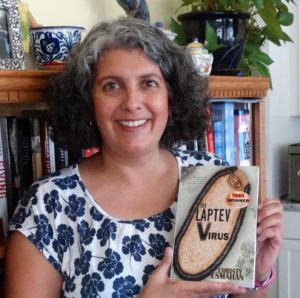
I took this picture from the window of a bus as I was travelling between Ponferrada and Leon. I just love the lighting. It almost looks like a painting to me.
One of the things that fascinated me when I lived in Spain was the prevalent use of aphorisms. I love these mostly because they introduce me to a new way of looking at a situation, a new way of thinking, and connect me to the people who coined these phrases, many of whom lived hundreds of years ago. I love it that the human condition has so much that is constant. So today, in honor of the fact that I have visitors from Spain, I’m going to share some of my favorites, with loose translations or equivalents.
Hay que estar a las duras y a las maduras. “You need to be keeping an eye on which ones are ripe and which ones are still too green.” The birds in my back yard do a great job with this one, literally, on my fig tree, and this year I didn’t get a single fig as the moment they were ripe, the birds ate them. But this aphorism extends to life in that you have to be watching out for opportunities. Sometimes they present themselves unexpectedly and the savvy person will recognize them and jump for them. I was often told this when I missed out on a chance to do something or go somewhere, especially my first year in Spain. I’d express my regret and someone would say, “Hay que estar a las duras y a las maduras.”
Cuando no hay mas, contigo, Tomás. “If there’s no one else, I’ll go with you, Thomas.” This is an interesting one that was used often in León, but not in other parts of Spain. I have a friend from Valencia who had never heard it before. It’s also fascinating that before hearing it, I had never noticed the need to use it in my conversations. And it doesn’t necessarily always, or even usually, refer to people—sometimes when I’m cooking and I want a particular knife, but it’s dirty, I’ll reach for a less favorite one, maybe the last one in the drawer. Or maybe I’d prefer a different flavor of yoghurt, but there’s only one left in the refrigerator. Oh, well, I’ll think, “Cuando no hay mas, contigo Tomás.”
Consejos doy, que para mi no tengo. This is a great one! “I give advice to others that I don’t take for myself.” As a mother, I hear myself doing this when I tell my kids to get more sleep or eat healthier…yeah, part of me knows I say these things to also convince myself to do them!
Pagan los justos por pecadores. This one just kills me, it’s so true! “The just/righteous pay for the sinners.” Every time I go through TSA and have to take off my shoes or pack only tiny bottles of liquids I find myself muttering this one under my breath—the bad ones ruined it for the rest of us!
De ilusion tambien se vive. This is a sweet one: “people need dreams” is the rough translation. For those of us who are stubborn optimists, this is a good one.
Mucho ruido y pocas nueces. “Lots of noise but not much nut inside” is a nod to people or situations where there is a lot of bluster, but not much happens in the end. Sometimes when the sky turns really dark here in Houston, and there is thunder and lightning and then we get two drops of rain I’ll find myself thinking “mucho ruido y pocos nueces.” Or when a salesperson will rant and rave about how much your life will change if you just buy this gadget…yeah, right. Interestingly, Shakespeare’s play, “Much ado about nothing,” is translated in Spanish as “Mucho ruido y pocas nueces.”
Nunca digas ‘De este agua no beberé’, ni ‘Este cura no es mi padre.’ This is a cute one, because of its two parts. “Never say ‘I’ll never drink this water,’ nor ‘This priest isn’t my father.” I know I’ve lost track of the times I declared in my youth that I’d never, ever do something, only to find myself 8, 10 or 15 years down the road, thinking very differently. (“I hate onions! When I grow up I will never use onions to cook!” Did I really say that to my mother?) The second part about the priest is a nod to the fact that for hundreds of years, priests kept their celibacy in public, but everyone knew that their “housekeeper” did more than clean the house. It’s kind of like our saying in English, “It just goes to show, you never know.” And, as I mentioned in my blog entitled “Spain is Different” (https://christyesmahan.com/?p=114) there is a lot in everyday Spanish life that refers back to the church.
Del dicho al hecho hay un gran trecho. I like the way this one rhymes. It basically means that between saying you want to do something and actually doing it, there’s a lot of distance. Look at me here, saying I’m going to have a book. I started writing it nearly 5 years ago, and now I’m still working on getting it published. Hopefully that will be some time in October. But, “del dicho al hecho…”
Los que duermen en el mismo colchon, se vuelven de la misma razon. Have you ever had a friend with her strong opinions and convictions, and then she meets someone, falls in love and gets married, and pretty soon she’s saying/doing things that she used to never say/do but which are very similar to what her new partner espouses? I’ve seen this happen lots of times, and I always remember this aphorism: “those who sleep on the same mattress end up believing the same things.”
And one of my favorites, probably because I didn’t really get it for a long time, “Me he puesto las botas.” This one is also commonly changed, depending on who is doing it, and when they are doing it, so you can say, “Se va a poner las botas,” for future, or “Se pusieron las botas,” for past tense, and if you know some Spanish, you’ll have noticed that I was also changing the pronouns. The basic translations of these three phrases are “I put on my boots,” or “He will put on his boots” or “They put on their boots.” But it’s got nothing to do with boots or even with getting dressed. It’s about having a really good time. If you thoroughly enjoy a meal, licking your fingers at the end, you’ve put on your boots. If you have a Harry Potter reading fest, like my kids have done sometimes, or watch all of The Lord of the Rings movies in a row, thoroughly (and loudly) enjoying every moment, you’ve put on your boots. Or, for me, right now, I’m having a really great time with my friends from Spain, showing them around Houston, so I can say, “Me estoy poniendo las botas.” Cute one, isn’t it? I smile just to think of it!
So now it’s your turn to share: what are your favorite aphorisms, in any language, and why?
If you enjoyed this blog post, you might also like my series of novels, Bueno, Sinco and Brujas, which takes place in Santander, Spain.



2 comments
1 pings
It took me a while to understand the second one, but when I did the Portuguese equivalent came quickly and I am sure you’ll like it: não tem tu vai tu mesmo.
Author
Thank you, Salvador! It’s fun to see wise old sayings in so many different languages!!
[…] Spain, only has 1,000 nests.) There’s even an aphorism, which I didn’t include in my previous blog about Spanish sayings, which goes “Por San Blas, la cigüeña verás. Si no la vieres, año de nieves.” If you […]